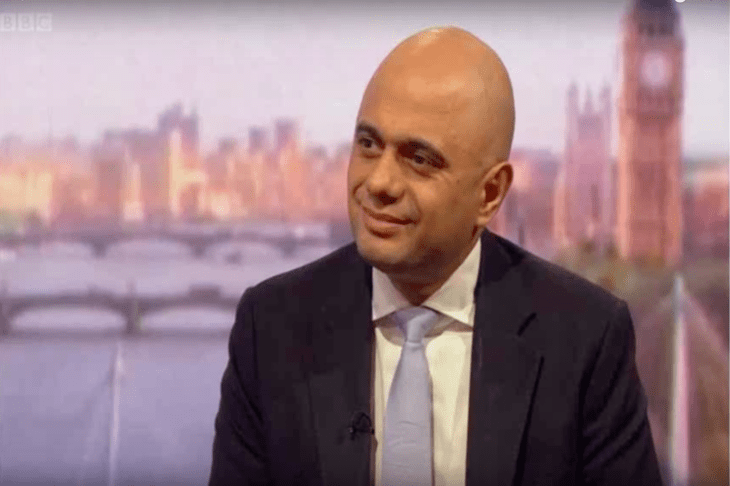Earlier on this morning, Andrew Marr tried his hand at Urdu. Or was it Punjabi? In any case, he made a point of introducing Lancashire-born and bred Minister Sajid Javid as ‘Sajeed Javeed’. The Communities Secretary didn’t flinch – as you’d expect, given that this is definitely not the first time his name has been mispronounced. He’s probably given up correcting people, or even noticing mispronunciations. But his name is hardly a tongue twister: he’s a northerner, his name rhymes with avid. As all schoolchildren know, words ending in –id are pronounced with a short ‘i’. Lid, kid, hid, quid. So where did Sajeed Javeed come from?
As a member of the club of British people with problematic first names, I can appreciate the problem. Growing up in China, I didn’t realise that Xiaodan, my Chinese name, would cause such headache (to myself, mainly) in British classrooms. So pretty early on I’ve used my other name, Cindy. This is common for émigrés from my part of the world. But southeast Asians (and their children) tend to stick with their traditional names – and run the gauntlet of pronunciation. I admire them for that (I also wish my name didn’t have an ‘X’ in it).
It’s a tricky issue. Most people are kind-hearted and try to make society as accommodating as possible for everyone, as Andrew Marr would have been seeking to do. I would love it if someone would be able to pronounce Xiaodan correctly. But trying accents (and probably getting them wrong) risks ‘othering’ people – alienating these people from the ‘us’ into the ‘them’. Now I was born in China, and I identify strongly with my Chinese heritage. As a result I not only don’t mind being ‘other’ed by native British (within reason), I actively promote my ethnic heritage – I’m proud of my black hair and narrow eyes, and I spent the entirety of last summer finding retro Mao-style trousers.
But the trap – and I find myself guilty of this too – is to assume that everyone identifies with the heritage of their ancestors, just because of the colour of their skin or the food that they eat. I have no idea about Sajid Javid’s diet, but he’s the product of only one nation, unlike me. To pronounce his name differently, just because his parents came from Pakistan, is a different kettle of fish. Born in Rochdale, state-educated, Exeter University to banking to the House of Commons: he is British through and through. Culturally, he’s Star Trek rather than Lollywood. The twin-identity card is not one he plays: on the contrary, he only ever talks about unity – for example, the importance of immigrants learning English.
For him, as for many other children of immigrants, Britain is home, and the British pronunciation of his name is the pronunciation of his name. And yet when you hear him mentioned on the radio, it’s invariably wrong. He gets all sorts: Sarjeed, Sarge, Savage – more recently, he has become Sadiq. (And this latest problem extends beyond broadcasting: there’s a rumour that he was once introduced as ‘Sadiq’ in a party fundraiser.) And by the way, Sajeed Javeed isn’t right either – none of my Pakistani friends know what language that’s meant to be.
British Asians in public life get a lot of this. The supposedly foreign dub on the name, even the assumption of immigrant status – as if to say ‘you’re not one of us.’ A BBC journalist asked Sadiq Khan, on a recent visit to Pakistan, ‘does it feel like coming home?’ Sadiq replied admirably, ‘home is South London, mate’. Quite a polite reply, considering the circumstances.
Things would be different if Sajid or Sadiq wanted to promote their ethnic heritage, or if they wanted their name pronounced in a particular way. But there is a rule: find out what the person wants. The BBC has a pronunciation unit supposedly devoted to doing this. It’s very happy to accommodate the wish of one Powell brother – Charles, foreign policy advisor to Thatcher – to pronounce his surname as ‘Pole’, and another – Jonathan, Tony Blair’s former chief of staff – as ‘Pow-ell’. Neither of the two were ever elected. Sajid Javid was, and he’s been in the Cabinet for four years now. So it ought not to be too much to ask for people to start getting his name right.







Comments